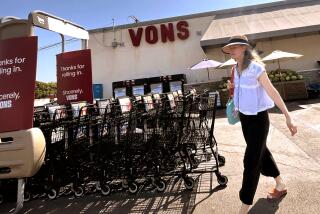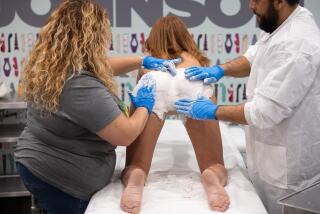A ‘Classic’ Buyout : When Orange-Based Van Doren Rubber Co. Was Taken Over, Founder Was Pleased
- Share via
Paul Van Doren thinks leveraged buyouts are as American as hot dogs, apple pie and sneakers.
In fact, he was pleased when Van Doren Rubber Co., the Orange-based tennis shoe company that he founded 23 years ago, was taken over in a leveraged buyout arranged by McCown De Leeuw & Co., a San Francisco venture-banking firm.
In Van Doren’s view, LBOs don’t deserve the black eye they have received in recent years. Millions of Americans, he said, have been using them for years to finance their home purchases.
“We can’t afford to buy a home for cash, so we finance it,” he said. Buyers pay off the loans from their salaries and sell their homes later at an appreciated price. “That’s how we get ahead,” Van Doren said.
Business LBOs are much the same. The buyers borrow most of purchase price, using the assets of the firm being purchased as collateral for the loan. The debt is repaid from the firm’s cash flow. In many cases, the company is eventually sold at a higher price.
McCown De Leeuw certainly hopes to come out ahead on the “mortgage” it took out a year ago to finance the $71-million buyout of Van Doren Rubber Co., maker of the popular Vans and Off The Wall brands of tennis shoes.
The type of LBOs arranged by George E. McCown, chairman of McCown De Leeuw, contrast with the greedy grabs for corporate assets that have fascinated Wall Street for several years.
McCown says his firm takes a “classic” approach to LBOs, one that calls for pumping in money, boosting production and paying off high-yield “junk” bonds from higher earnings, not from asset sales.
And earnings have indeed risen. Since it was founded in 1984, McCown De Leeuw has provided its investors with an average annual rate of return of 160% on companies it has bought and sold.
So far, McCown De Leeuw is having little trouble besting the pre-buyout performance of Van Doren Rubber Co. That is partly because Paul Van Doren, by his own admission, had been satisfied with existing profits and “too tired” of running day-to-day operations to improve the company’s performance.
In the year since McCown De Leeuw took over in February, 1988, the production rate at Van Doren Rubber has jumped 43% to 60,000 pairs per week, shoe sales are running 44% higher, and total revenue is expected to rise 20% to $52 million by May 31, the end of the company’s fiscal year.
In addition, exports have grown to 25% of sales from 10%, the number of employees has increased by about 240 to more than 1,320, new retail outlets have been added and a new clothing line is being introduced.
As a private company, Van Doren Rubber won’t disclose its profits.
The story of Van Doren Rubber is usually told in two chapters: the firm’s fast rise to national prominence after its black-and-white checkerboard sneakers were featured prominently in the 1982 teen movie “Fast Times at Ridgemont High,” and its fall into bankruptcy in 1984.
Van Doren Rubber Co. was founded in 1966 by Van Doren and an investor, Serge d’Elia, a Frenchman who lived in Japan. Later, Van Doren’s younger brother, James, and an executive, Gordon Lee, were each given 10% stakes in the firm.
Paul Van Doren ran the company until 1976, when the four owners equalized their stakes in the firm and James Van Doren assumed control.
Over the next 8 years, James Van Doren tried to put the company on the map by building its manufacturing operations, doubling its work force and expanding its product line into the highly competitive world of specialty athletic shoes.
While it tried to absorb the costs of the expansion, the company was squeezed by dwindling sales as cheaper foreign imitations hit the market and the Ridgemont High fad began to fade. The firm lost $3.6 million over a 21-month period and, finally, filed for protection from creditors in federal bankruptcy court.
The company emerged from bankruptcy in late 1985 with a plan to pay off all its debts in full, except for interest to unsecured creditors. At the insistence of some creditors, it also emerged with James no longer involved in the company.
Paul Van Doren, who returned to the helm of the reorganized company, said he hasn’t seen his younger brother since he, Lee and d’Elia bought out James’ interest and ousted him.
Except for its temporary decline, Van Doren Rubber has been a solid, profitable little company. It relied on an unusual manufacturing concept to produce unique shoes with waffle soles and a plethora of colors and designs that caught the imagination of the surfing and skateboarding sets.
So well-oiled was the production operation when it was sold, McCown said, that the only change McCown De Leeuw made was to hire Richard Leeuwenburg as president and chief executive.
Van Doren remained as chairman. Lee became vice chairman, and d’Elia continued in his role as a consultant to the firm. The three founders own a small, unspecified share of both Van Doren Rubber and McCown De Leeuw.
“When I first saw the plant, I thought this was one of the best manufacturing operations I had ever seen,” McCown said. “It runs like a Swiss clock.”
Leeuwenburg also was impressed. Of roughly 900 employees who work in the factory, only four are supervisors who are not “hands-on workers,” he said. “Yet the shoes are high-quality, there’s low spoilage and it’s all done without managers.”
The workers are assembled into teams, each with a designated leader. The teams are given a daily quota to meet and can go home whenever they’re finished. Often, Leeuwenburg said, factory employees get paid for 8 hours a day but work as little as 6 hours.
That work concept created a degree of efficiency, he said, that has helped Vans respond to the market quicker than other shoe manufacturers.
“Vans’ staying power is that it’s a domestic company and can supply any size or width of shoe quickly,” said Bill Boettge, president of the National Shoe Retailers Assn. “They’re also able to capture a fickle fashion market.”
McCown said that a dealer can have “anything in our catalogue shipped within 5 days, while it takes 9 months for any of our competitors.” And, since there are no discounts for volume, he said, a dealer can order any amount.
About a third of the company’s business consists of custom-designed shoes for individuals or groups, like high school bands, McCown said. Custom orders cost about $2 to $5 a pair more and take about 3 weeks to deliver.
When McCown De Leeuw took over, it didn’t change the basic game plan. Instead, it embarked on a program to foster greater esprit de corps at the firm. This year, for instance, the company started offering English classes to its Mexican-American workers.
“We think our employees are awfully good, and we want them to stay our employees,” he said. “We also like to think we’re good corporate citizens in Orange County.”
Since nearly all the factory workers are Mexican-Americans or Mexican nationals--many with relatives also working in the plants--the company has tried to ensure that they have proper credentials. Five years ago, federal immigration agents swept through two company plants, snaring 140 suspected undocumented workers, some of whom were caught fleeing the scene.
Today, Leeuwenburg said, the company is in “strict compliance” with immigration laws.
Besides producing more shoes, Van Doren Rubber is licensing its Vans brand name to a Virginia manufacturer of shorts, woven shirts, and skateboard and beach pants. It already has a few licensed products such as sunglasses and appointment books left over from its heyday in the early 1980s.
“But we’re going very slowly,” Leeuwenburg said. “We don’t want a repeat of past performances.”
McCown De Leeuw expects to sell Van Doren Rubber or take it public some day, but McCown said he is not in any hurry. The venture-banking firm tries to hold onto its acquisitions for 4 to 7 years, he said, while it builds up the value of the acquired companies.
“We see Vans as potentially a public company,” McCown said. “It has the kind of growth potential that makes it a very good candidate for an initial public offering. But the company needs a track record, so it’s not going public this year. Perhaps in 2 or 3 years.”
McCOWN DE LEEUW & CO. DEALS
1985
MDC acquired Western Lumber Co. in San Diego for $27.5 million, of which $1 million was cash put up by MDC. Western Lumber acquired a major competitor in 1987 and was sold in December, 1987, to Georgetown Industries for $40.2 million. MDC received 9.2 times its cash investment.
MDC acquired First Trust Corp. in Denver and simultaneously merged it into FIserv Inc. in Milwaukee, investing a total of $25 million in the combined data-processing company. MDC’s portion of the investment was $1.5 million, or about $6 a share. FIserv went public a year later, and MDC distributed to its investment partners stock worth $20 a share.
1986
MDC acquired Coast Gas Industries Inc. in Watsonville for $23.5 million, of which $2 million was put up by MDC. Coast has since bought 10 other LP gas distributorships.
MDC acquired Paragon Restaurant Group in San Diego for $118 million, of which $4 million was put up by MDC. Paragon acquired the Rusty Pelican chain a year later for $26 million in borrowed money, recapitalizing Paragon in the process.
1987
MDC acquired Snider Lumber Products Inc. in Turlock for $20.3 million, of which $2 million was put up by MDC and affiliates. Snider was sold 18 months later to Fibreboard Corp. for $14 million, giving MDC 4.8 times its equity investment.
MDC acquired BMC West Corp. in Boise, Idaho, for $37.5 million, of which $2 million was put up by MDC. The building-materials distributor was recapitalized with $10 million in subordinated debt last year to fund acquisitions of other companies.
1988
MDC acquired Van Doren Rubber Co. in Anaheim for $71 million, of which $6.75 million was put up by MDC. The maker of Vans shoes has since closed some stores and opened others to give the company 54 retail outlets in Southern California, a net increase of 2 stores.
VAN DOREN RUBBER CO. AT A GLANCE
The company was founded in 1966 by Paul Van Doren and Serge d’Elia. Its headquarters and all manufacturing operations are in Orange.
Sales (year ended May 31, 1988): $43 million
Number of employees: 1,325
Number of shoes produced: 60,000 a week
Retail stores: 54
Chairman: Paul Van Doren
President, chief executive: Richard Leeuwenburg
More to Read
Inside the business of entertainment
The Wide Shot brings you news, analysis and insights on everything from streaming wars to production — and what it all means for the future.
You may occasionally receive promotional content from the Los Angeles Times.










